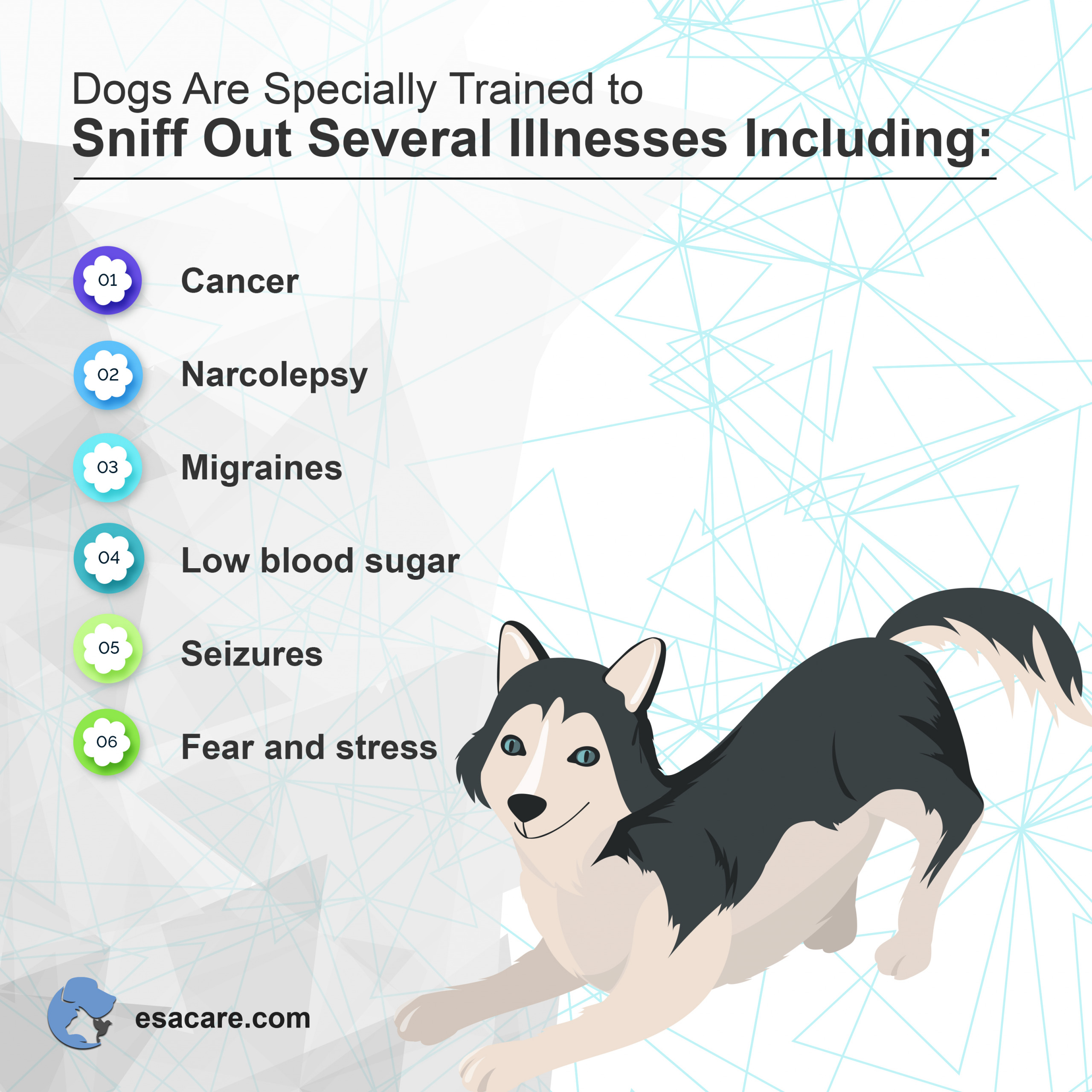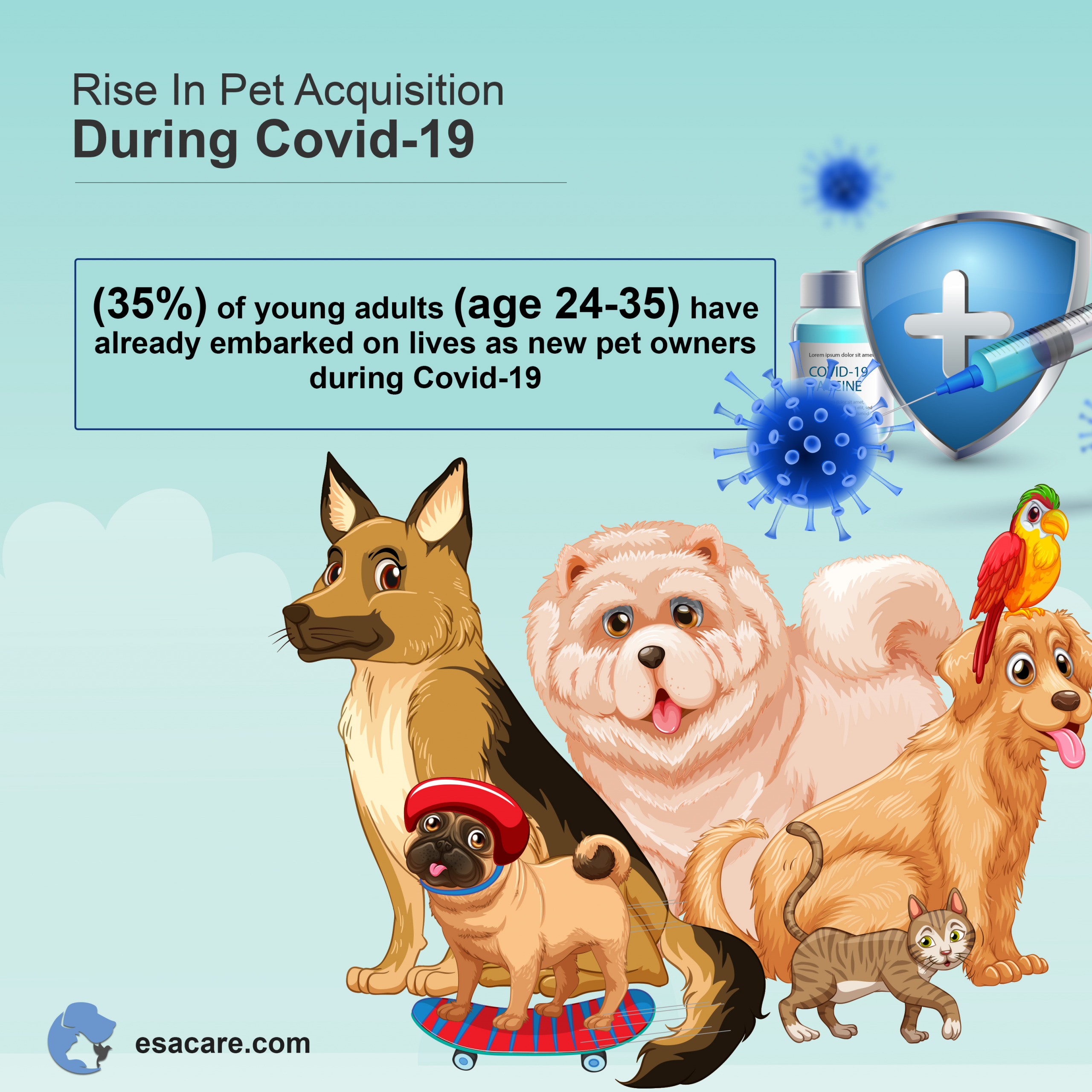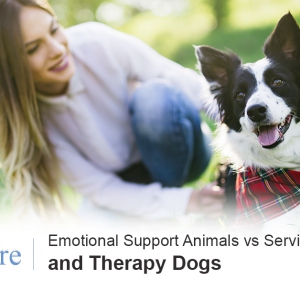Can Emotional Support Dogs Sniff Out Covid-19?
For centuries, dogs have been man’s most faithful friend. Later, the trusted furry friend also became a companion and helper, with some being recognized as emotional support animals (ESAs) and service dogs. However, with the advent of the Covid-19 pandemic, they are being given the more complicated task of being trained as Covid sniffing dogs.
Your ESA dog can be your best companion in loneliness. Click the button below to get your ESA letter.
Table of Contents
Can Dogs Illnesses and Infections?
So, can dogs smell illnesses? More precisely, can dogs smell Covid-19? These loyal furry companions are known for their powerful sense of smell. It is so powerful that they can sniff out infections and medical conditions. This is thanks to scent receptors in their nose that number over 220 million. People have five to 10 million. Their strong sense of smell gives dogs an ability to detect odors 10,000 to 100,000 stronger than that of people.
Apart from the plentiful scent receptors in dogs, they can detect tiny changes in the human body. This includes the slightest change in hormones the release of volatile organic compounds (VOCs) that cancer cells release.
Can Dogs Smell Covid-19?
It is believed that dogs can be trained to detect Covid-19. They are being introduced to sniff it out even in people who do not have symptoms. This begs the question of how to train sniffer dogs to detect Covid-19. The process of training involves having them sniff samples in a training room and alerting their handler if they detect the virus.
This training is also pegged on the belief that dogs can be trained to detect even slight changes in skin temperatures. This gives them the potential to detect if a person has a fever. Once a trained dog sends out an alert that they have detected the Covid-19 virus, the person in whom it has been detected would then be required to take a test to confirm the diagnosis.

Trained Dogs
Research Into Covid-19 Detection Dogs
The challenge with research into Covid detection dogs is that many of these findings are yet to be reviewed by peers or certified by concerned research and medical institutions. This makes it difficult for the claims to be evaluated and substantiated. There is also the question of whether it will be possible to adequately train enough sniffer dogs to work in the busiest areas where the Coronavirus that causes the infection is highly likely to be present.
The goal is for trained Coronavirus sniffing dogs to play a role in controlling, if not ending, the pandemic by screening hundreds of people in an hour. This would be in busy airports, train stations, sports stadiums, and entertainment spots. Apart from being quick and efficient, Covid-19 sniffing dogs would cost less than testing and detection methods like the polymerase chain reaction (PCR) method that amplifies an RDA or DNA template so that microorganisms like viruses can be detected.
Your ESA dog can be your best companion in loneliness. Click the button below to get your ESA letter.
Countries Undertaking Research on Covid-Sniffing Dogs
In Germany, veterinary neurologist Holger Volk, stationed at the University of Veterinary Medicine Hanover, is leading the effort to study and train Covid-sniffing dogs.
Research is also being done in the U.K by the Department of Disease Control at the London School of Hygiene and Tropical Medicine (LSHTM). James Logan, the head of the department, has reported that while the institute is yet to determine whether Covid-19 has a specific odor. However, research is ongoing based on the fact that other respiratory diseases change body odor.
Research is also being done at the Medical Detection Dogs. The center’s founder and CEO, Dr. Claire Guest, says that they are sure that dogs can detect Covid-19. The center is now looking into how dogs can see it even in those who do not have symptoms.

Pet Acquisition
U.S Testing Center Says Its a Go
According to a study done in the U.S, dogs can sniff out Covid-19. In a Proof of Concept Study published by Bio Med Central (BMC), three dogs were intensely trained in sniffing out Covid-19. They were introduced through classical conditioning for seven weeks, during which they were taken through the conditioning process almost 1,000 times. The dogs that were trained were three male and female dogs. One was a German shepherd, another was a German black, and the third was a Labrador.
The dogs were introduced to human specimens extracted from the throat and pharyngeal secretions of participants who had already been tested for SARS-COV-2.
A similar conditioning test was done using the clothes and masks of a person who had tested positive for Covid-19. This test was done on three other dogs. One was a Labrador, another was a border gypsy, and the third was a golden retriever. In the first test, 80 pharyngeal secretion samples were used. 26 of them were positive, while 54 were negative. They had been collected from different medical centers and had undergone the RT-PCR test using the single-blind method. In the second test, 50 positive samples and 70 negatives were used. They were also collected from different medical centers were used.
The result was that in the first test, the sniffer dog’s detection capability was 65% for sensitivity and 89% for specificity. The dogs corrected detected 17 out of the 26 positive cases and 48 out of 54 negative samples. The dogs correctly sniffed out 43 out of the 50 positive samples in the second test and 65 out of the 70 negative samples.
Are There Dog Breeds That Are Better at Sniffing Covid-19?
With research still going on and without a significant, well-processed compilation of research methods and findings on Covid-19 sniffing dogs, it is impossible to say which dog breeds are better than others at sniffing Covid-19.
However, it is believed that the best sniffer dogs would be service dogs. These are dogs trained to perform specific tasks and work for people with disabilities such as blindness, deafness, autism, and other conditions and illnesses. For this reason, they may be ideal for training as Covid-19 dogs.
Get rid of isolation with an ESA pet. Click the button below to get your ESA letter.
Conclusion
If you want more information about Emotional support dogs and PSDs, get in touch with ESACare. You will be taken through everything you need to know about them and assistance with registering your four-legged friend and helper so you can access public places, air travel, and other places ordinary pets cannot access.
Contact Us today at EsaCare for a legal ESA letter or click the banner below to book your appointment.










 347 5th Ave Suite 1402-112,
347 5th Ave Suite 1402-112,

Leave a Reply
Want to join the discussion?Feel free to contribute!